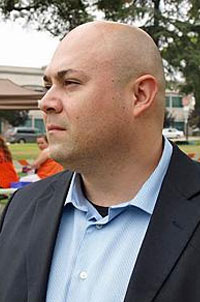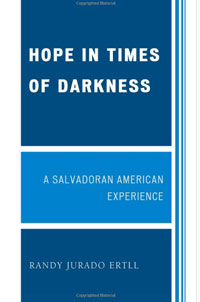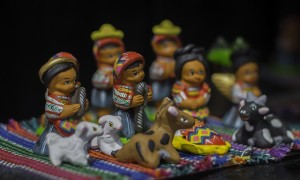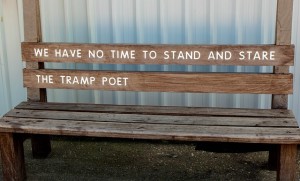This week’s featured author is Randy Jurado Ertll. Randy is the author of Hope in Times of Darkness. This book depicts his experience of being born in the U.S., his mother being deported, him going to live back in Salvador, and then moving back to the United States at the age of five. He is currently working on his second book. His book takes us on a journey of growing up in tough neighborhoods, surviving, being a role model, and then success. Read our interview with Mr. Ertll and see what inspired him to become a writer.


Tell us a little bit about yourself; where you grew up, city where you currently reside, family upbringing, or anything you would like our readers to know about you?
I was born in Los Angeles. However, at eight months old, my mother and I were deported to El Salvador. I grew up there till age 5. Then I returned and I grew up in South Central Los Angeles. I currently live in the San Gabriel Valley.
I have the rural and urban experience. I have been through the thick and thin of things. Trials and tribulations but that is why I write – to motivate and inspire others to succeed in life. To not be ashamed of the mistakes that we have made – cause everyone sins – whether through deeds or in our minds when we say or think ill things of others.
Your book Hope in Times of Darkness discusses your experiences of growing up Salvadoran in both in Salvador and American. What was the big reason you decided to write about this and what did you hope to accomplish?
I have read many, many books in my life (I wish that I knew the exact number), and I am still enamored with the written word. I loved certain books as a child from John Steinbeck and others. I discovered Latino literature at Occidental College. I began to read works by James Baldwin, Alex Haley, Oscar Zeta Acosta, Carlos Fuentes, Gabriel Garcia Marquez, Maxine Hong Kingston, and I read Maya Angelou in middle school. I think that I read the whole section related to Latin American (especially El Salvador related) books at the Occidental College library.
Eventually, I wanted to write my own story from my own perspective in a non- fiction, narrative manner; to tell my point of view of some of the injustices and inequities that I have lived through and witnessed first-hand. I saw violence, murders, chaos, and I wanted to express myself through the written word.
Writing a memoir can be a healing experience. Did you find this to be true?
Well, it is not necessarily a memoir since I am not too old. It is more of a non- fiction, narrative; to tell the story of the sacrifice and suffering of the Latino and African American community in South Central Los Angeles. How many Latino authors have come from South Central? Not many. My book is a universal story that any Race, ethnicity, or nationality group can most likely relate to.
Yes, it can be a healing, yet not so healing process since writing brings up so many memories as well such as anger, but eventually we rationalize that it creates hope. That is what I try to do – to turn anger, frustration, and bitterness into a more positive perspective. We grow through sacrifice, pain, and suffering. I can relate to the young people who have to live in violent neighborhoods and schools.
Once you decided to write this memoir, how long did it take you to complete?
I wrote it in one summer. I was really motivated and inspired. But it took me about one year with the editing process. It took another year to be accepted by two publishers.
Did you always want to write or did this desire to do so come later in life?
I did not necessarily realize that I had the power to write a book. One day something clicked. I had just read Victor Villasenor and I was also inspired by Luis Rodriguez’ writing, perseverance, and example. It’s similar to how I did not know that I could bench press 400 lbs. (now I am showing off). Writing is similar to power lifting – you have to lift one pound at a time and you have write – one word at a time.
What would you say was the most difficult obstacle to writing your book? Was it the technique of writing, publishing it, or marketing it thereafter?
The most difficult was finding a suitable publisher. I am glad that I found an independent, academic publisher that has an excellent reputation; Rowman & Littlefield Publishers.
There is no one technique. It is a road with much roadblocks and naysayers. You have to keep writing from your heart, life experiences, and you have to do it almost every day to become proficient at it. Of course, you never really become a master or are perfect in it. We always make mistakes as humans. Example, the classic books have mistakes. Therefore, it is true – no one is perfect. If you can find a perfect person – I would like to write their biography.
What steps would you suggest a writer take before they begin on writing a memoir?
You have to practice, practice, and practice. You have to be ready to expose yourself to the world – with the good and the bad. You will be judged. Get ready for a roller coaster ride whether you like it or not.
You were born here, your mother was then deported, but she chose to take you back with her rather than leave you here alone. Can you talk about that experience and how that shaped your life?
I believe that can be traumatic for any child, especially when you are a baby. Then my grandparents helped to raise me in the countryside because my mother had to work in San Salvador. Pain is being torn from your parents. Pain is when your child is taken away from you. When I returned to Los Angeles at the age of five and not knowing English, it was a nightmare! I suffered a lot.
Eventually, I learned English and began to accept and learn the traditions and social cultures of the U.S. I became immersed by watching Scooby Doo, The Land of the Lost, The Streets of San Francisco, The Justice League, and I still remember MASH and the Lavern & Shirley theme songs. My favorite show was the Twilight Zone. That show had some powerful political messages.
Who or what inspires you?
God and all of the special people in my life! They have struggled and suffered much but we are still here – working and trying to make a difference for our sons, daughters, nephews, nieces, cousins…trying to set a good example. Even if we screw up we can get up and keep going.
I also get inspiration from people who have been down and out – who have had drug and alcohol addictions and chose to turn their lives around for the better. It is possible, not easy, but possible. I get inspiration from music too: Shakira, Tupac, Notorious BIG, Nortenas, Selena, Classical music, jazz, and the teachings of Gandhi. I sometimes listen to heavy metal and classic rock too – depends on the mood.
If you had to define success, how would you define it?
Having love in your heart and being able to forgive. To try very hard not to judge others – have we walked in their shoes to know their pain? Their addictions? Their anger?
Many times we have to travel that tough road to know how tough it is to make it out of the ghetto and violent/abusive situations. Sometimes people feel trapped, but through writing, we can inspire others not to feel trapped.
Can you give us a heads up as to any upcoming books or projects in the near future?
Yes, working on my second book now. Almost done. Hope for it to be published and out in 2013. Also, my colleague, Edward Gonzalez, made a documentary and included my book/life story in the documentary that will come out in 2013. It is called Words of Revolution.
Check out my web site at WWW.RANDYJURADOERTLL.COM for more information and upcoming book signings/presentations.
Contact: www.RandyJuradoErtll.com
 Guatemala has a long, diverse and rich cultural history. It is known throughout the world because of its beautiful rainforests and its ancient Mayan history and sites. Guatemala City is the capital and it has many things to see and visit. The roads still carry that cobblestone nostalgia and many of the colonial buildings that existed during the Spanish conquest have been preserved.
Guatemala has a long, diverse and rich cultural history. It is known throughout the world because of its beautiful rainforests and its ancient Mayan history and sites. Guatemala City is the capital and it has many things to see and visit. The roads still carry that cobblestone nostalgia and many of the colonial buildings that existed during the Spanish conquest have been preserved.
 Why is Poetry so important and essential to a culture? There are various factors, but the most apparent one is that poetry is a way to see a culture’s history and people through the lens of regular citizens who live the everyday life. Poetry can capture many things in a culture such as a people’s struggle, love, relationships, their dismiss of life, or their awe of nature. The list is endless. In addition, poetry provides a way for ALL people to engage in the current political climate of their country or locality, thus providing great literature for all those that may want to understand a particular time and place and/or government and people. It becomes a glimpse into the past and also the potential future.
Why is Poetry so important and essential to a culture? There are various factors, but the most apparent one is that poetry is a way to see a culture’s history and people through the lens of regular citizens who live the everyday life. Poetry can capture many things in a culture such as a people’s struggle, love, relationships, their dismiss of life, or their awe of nature. The list is endless. In addition, poetry provides a way for ALL people to engage in the current political climate of their country or locality, thus providing great literature for all those that may want to understand a particular time and place and/or government and people. It becomes a glimpse into the past and also the potential future. What is culture? They say that to understand a culture, is to understand its people. This couldn’t be further from the truth. But more systematically, it is the essence of who we are, our knowledge, our belief systems, our values, our attitude of life, and our role in society as a whole. It is all these collective things that gives us an identity and falls into the realm of cultivated behavior. Don’t you think it’s time to open up the many doors and view the world?
What is culture? They say that to understand a culture, is to understand its people. This couldn’t be further from the truth. But more systematically, it is the essence of who we are, our knowledge, our belief systems, our values, our attitude of life, and our role in society as a whole. It is all these collective things that gives us an identity and falls into the realm of cultivated behavior. Don’t you think it’s time to open up the many doors and view the world?




